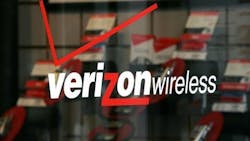U.S. Curbs Verizon's Wireless Entertainment Push
The U.S. Justice Department announced limits on Verizon's effort to expand its wireless entertainment footprint, amid worries the cellphone and cable giant was building a monopoly with other cable operators.
After a seven-month review, the department approved Verizon's $3.6 billion deal to buy wireless spectrum from major cable television rivals Comcast, Time Warner Cable and Bright House Networks.
But it placed limits on the four companies' plans to cooperate in their respective markets as a part of the deal by bundling their products together.
It also said Verizon, the country's largest wireless phone carrier, would divest some of the spectrum to smaller competitor T-Mobile.
T-Mobile was left in a weak position spectrum-wise after regulators squashed its takeover by Verizon rival AT&T last December.
The deal announced by the four last December, one of the largest spectrum sales ever, sparked antitrust lawsuits over fears that Verizon would sell its expanded wireless services together with the cable services of the others, binding the companies' businesses closely together.
The result, regulators feared, would be that the four would stop competing between themselves in cable, wireless, DSL and other services.
In addition to its wireless business, Verizon competes in the DSL and cable TV sector with its FiOS bundled wired service.
Regulators also feared that the joint marketing would give Verizon an unassailable position in the rapidly growing 4G LTE-standard wireless broadband and video market.
The sector has been booming as online streaming has improved in quality and as more consumers opt to stream multimedia like films via wireless phones and tablets rather than wire-based televisions and computers.
Verizon said in December that the spectrum deal would give it access to 259 million more potential customers for its newest generation wireless service.
"By limiting the scope and duration of the commercial agreements among Verizon and the cable companies while at the same time allowing Verizon and T-Mobile to proceed with their spectrum acquisitions, the department has provided the right remedy for competition and consumers," said Joseph Wayland, who heads the Antitrust Division of the Justice Department.
In approving the deal the department did not forbid the joint marketing or bundling of products. But it blocked early agreements between the four that would have restricted or discouraged Verizon from marketing FiOS services against the other three.
And it put a time limit joint bundling exclusivity deals between Verizon and the cable firms, as well as a time limit on a new technology research joint venture between the four.
The department said that under the original deal terms, the open-ended collaboration could have threatened long-term competition and hindered the companies from pursuing innovations outside the joint venture.
- Paul Handley, AFP
Copyright Agence France-Presse, 2012
About the Author
Agence France-Presse
Copyright Agence France-Presse, 2002-2025. AFP text, photos, graphics and logos shall not be reproduced, published, broadcast, rewritten for broadcast or publication or redistributed directly or indirectly in any medium. AFP shall not be held liable for any delays, inaccuracies, errors or omissions in any AFP content, or for any actions taken in consequence.
